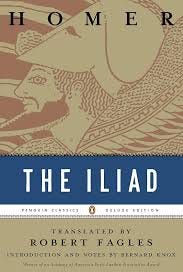But they speak a thousand different tongues
The Scepter Passes
As Book 2 of the Iliad begins, the morale of the Greek army must be at a breaking point. The confrontation between Agamemnon and Achilles in Book 1 was disastrous, leaving Agamemnon’s leadership in a precarious state. Given this context, it is unsurprising that Agamemnon decides to test his troops before launching another assault on Troy. His coalition—a patchwork of contingents from across Greece—needs to be assessed for its willingness to continue under his command.
After Agamemnon’s address to the army, Odysseus takes the divinely inherited scepter from him, a profound symbol of Agamemnon’s loss of stature. Odysseus, now bearing the scepter, carries its authority with him to rally the troops and restore order.
The Ugliest Man to Ever Come to Troy
Among those Odysseus encounters is Thersites, a figure both unsightly and unrestrained in his speech. Thersites launches a scathing tirade against Agamemnon and the Greek cause, showing no fear of reprisal. Homer lingers on Thersites’ physical deformities in striking detail, raising the question: Why this emphasis on his appearance? Perhaps Thersites’ ugliness is not merely physical but symbolic. His behavior and attitude stand in stark contrast to the values the Greeks held dear, such as loyalty, respect for authority, and the pursuit of glory. In this light, Thersites’ external form mirrors the internal qualities that the Greeks found detestable, earning him the title of “the ugliest man to ever come to Troy.”
The Scepter Cracks Down
It is no coincidence that the scepter—a symbol of divine and kingly authority—becomes the instrument of Thersites’ punishment. Odysseus strikes him with the scepter, silencing his dissent and reasserting order. The choice of weapon is significant: a sword, fist, or club might convey brute force, but the scepter embodies a weightier, almost sacred message. It is not just a punishment; it is a reminder of the divine hierarchy and the sanctity of leadership, however fraught Agamemnon’s position may be.
The Troops Rallied
The combined efforts of Odysseus and Nestor prevent the army from descending into mutiny. Although Agamemnon regains enough control to marshal the troops for battle, a lingering trepidation persists among the rank and file. This unease underscores the fragility of the Greek alliance after nine long years from home.
The Catalogue of Armies
Before the Greeks engage in combat, Homer devotes nearly nine pages to cataloging the various contingents of the Greek army. This exhaustive list celebrates the strength and honor of the Greek forces. In contrast, the Trojans and their allies receive only about two pages of description. The disparity in emphasis reveals more than numerical superiority; it reflects the Greeks’ inherent advantages in shared cultural values such as glory, honor, and military prowess.
In fact, there is a stark warning in the Trojan description. When Iris, the messenger goddess, descends to Priam’s gates, she delivers an ominous message:
Armies of allies crowd the mighty city of Priam true, but they speak a thousand different tongues.
The Trojans are fragmented by linguistic and cultural divides. This contrast between the unified Greeks and the disjointed Trojans foreshadows the struggles that lie ahead, for both sides.



